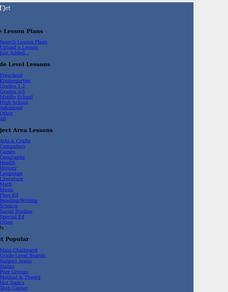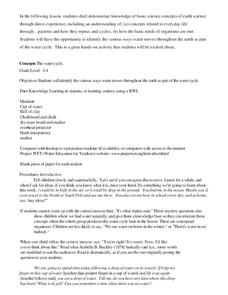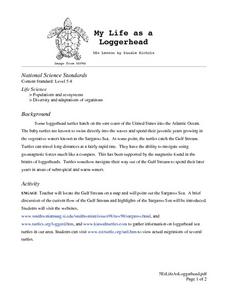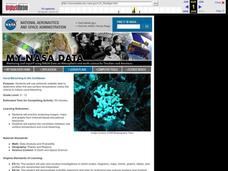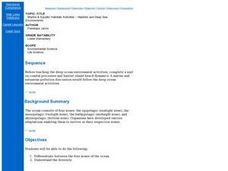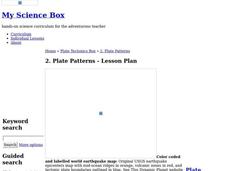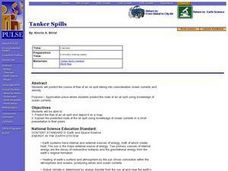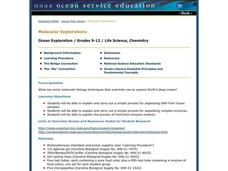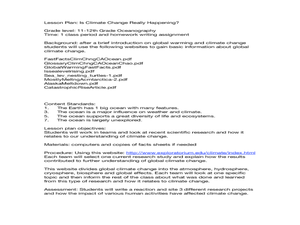Curated OER
Around the Water Cycle--A Reader's Theater
Students read aloud a play script in a group to research the water cycle. They take the parts of raindrops. The amount of raindrops can be adjusted to fit group size.
Curated OER
The Water Cycle
Students access prior knowledge of the water cycle by completing a KWL. In this water cycle lesson, students follow the movement of water through the water cycle.
Curated OER
Inside-out Adaptations
Students describe sea stars adaptations and explain how these enable them to survive in different environments. In this animal adaptation lesson students watch a video, get into groups and create a list of characteristics of sea...
Curated OER
Estuarine Currents
Learners explore an estuarine system to gather data on density driven currents. This type of current is contrasted with temperature and wind driven currents.
Curated OER
Leaving Home
Students explain the importance of larval dispersal and retention to populations. They collect data on organisms and examine it.
Curated OER
Natural Inquirer
Learners interview wildlife experts to gain information needed to research and write a report about an aquatic plant or animal affected by climate change.
Curated OER
Sea Stars and the Northern Abalone: A Race for Life!
Students compare and contrast the ecosystem, structure and behavior of survival of the abalone versus the sea star. They consider the ramifications of reintroducing the endangered abalone. They present their findings to the class.
Aquarium of the Pacific
Turn a Cow into a Whale
Third graders explore animals that might have a common ancestor and resemble one another. For this cow and whale lesson, 3rd graders recognize the similarities between the whale and the cow. Students complete worksheets based...
Curated OER
Pollution Solution
Young scholars explore the topic of oil pollution and how it affects the global ocean. They discuss oil spills in recent history and use problem solving skills to decide what strategies could be used to actually clean up an oil spill....
Curated OER
Ocean Stratigraphy Challenge
Students are asked to explain the sequence of rock and sediment types and to devise an experiment to test this hypothesis. It is intended for students with some prior knowledge of oceanography, sedimentary geology, and plate tectonics...
Curated OER
The Rhythm of Life - Episode 2 - Melody
Students complete a unit on melodies from various cultures. They watch an online program, analyze various melodies, write a short original melody, complete a worksheet, and compare/contrast three versions of "Amazing Grace."
Curated OER
My Life as a Loggerhead
Students discuss the current flow of the Gulf Stream and the characteristics of the Sargasso Sea. They visit websites to gather information on loggerhead sea turtles. Students imagine that they are newly hatched loggerhead turtles.
Curated OER
Coral Bleaching in the Caribbean
Students use authentic satellite data on the NASA website to determine when the sea surface temperature meets the criteria to induce coral bleaching.
Curated OER
Habitats and Deep Sea Environments
Students examine and identify the characteristics of the four zones of the ocean. They discover the amount of diversity in marine habitats. They also explore the adaptations organisms have that have allowed them to survive.
Curated OER
Food Web Mystery
Students describe typical marine food webs, and explain why food is generally scarce in the deep-ocean environment. They discuss reasons that seamounts may support a higher density of biological organisms than would appear to be possible.
Curated OER
Fish Are Animals Too
Young scholars create posters that show how a shark is a major predator in kelp forests and coral reefs after studying the food webs for these ecosystems. They determine that fish are important animals in the ocean's web of life.
Curated OER
Fisheries Project
Students explore biology by completing a fishing worksheet. In this commercial fishery lesson, students identify the process of taking mass fish from the ocean and delivering them to eateries while discussing the negative aspects....
Curated OER
Plate Patterns
Students review the patterns they discovered from a previous activity. In this investigative lesson students plot data as a class and color a map.
Curated OER
Fisheries And Songs
High schoolers view examples of songs that have the ocean and its life as their themes. After hearing and reading them, students write their own, having done research on the social and political issues of the ocean's environment.
Curated OER
Oceanography
Fourth graders define new vocabulary associated with oceanography. They locate and label the four oceans. They also identify features of the ocean floor.
Curated OER
Tanker Spills
Students predict the flow of an oil spill and depict it on a map. They explain the predicted route of the oil spill using knowledge of ocean currents in a short presentation to their peers.
Curated OER
Molecular Explorations
Young scholars explain the processes for separating DNA from tissue and separating complex mixtures. In this exploratory lesson students complete a lab where they extract DNA.
Curated OER
Sunken Slave Ship
Learners imagine they are archaeologists who are looking for treasure under the sand or sea. They work in teams to create the story and site of a shipwreck in a tub or aquarium filled with sand and water.
Curated OER
Is Climate Change Really Happening?
Young scholars explore the impact of global warming. In this oceanography lesson, students investigate global climate change and write reaction papers about their research findings.


